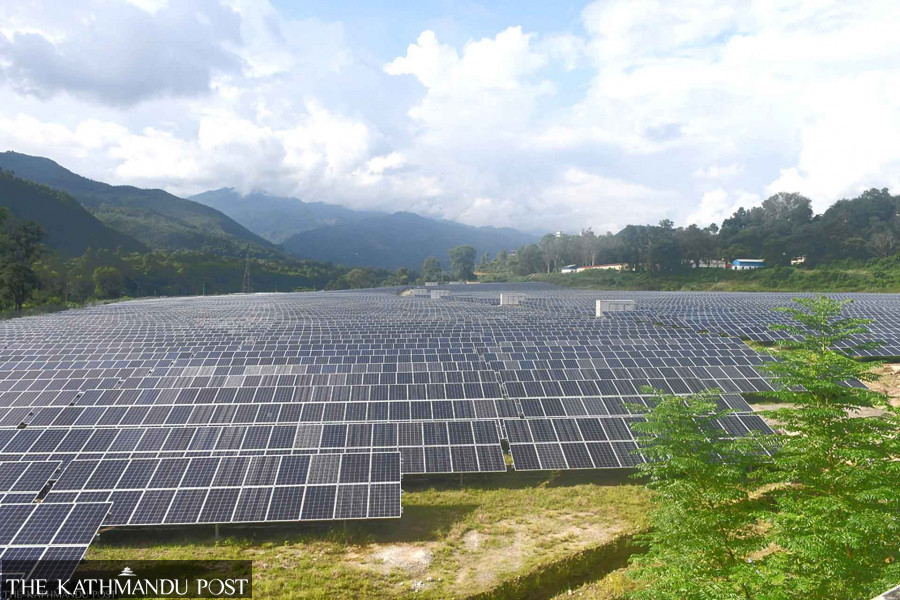Money
Call for reconnecting rooftop solar plants to grid
Though the Nepal Electricity Authority had decided to buy solar power from households in 2017, it now appears unwilling.
Prithvi Man Shrestha
For the past few months, Bishal Thapa, an expert on energy economics and financing, has been running a campaign for reconnecting rooftop solar power plants with the national grid.
After the state-owned power utility, the Nepal Electricity Authority (NEA), stopped buying solar electricity from rooftop plants from July, Thapa has been collecting signatures from stakeholders to petition the NEA to roll back the decision.
The petition calls on the NEA to reinstate the system, which will enable ‘net metering’ under which the power utility body pays its customers for the electricity supplied back to the national grid.
“The NEA suspended net metering without any notice and without prior announcement,” he said in the petition. “Suspension of net metering by the NEA is contrary to the government’s “Grid Connected Alternative Electricity Guidelines, 2078”.
Thapa said that the NEA didn’t renew its working procedures on allowing grid connection with a solar home system which was implemented for three years and stopped in July.
“The NEA cannot go against the provision of the Grid Connected Alternative Electricity Guidelines, 2078,” he said.
The set of guidelines introduced by the government last year has opened the door for net metering of solar home systems. It says that the NEA will pay for the electricity at the rate determined by the Electricity Regulatory Commission. For this, the promoter of the home solar system should submit an application to the power monopoly. No construction licence is required for setting up home-based solar plants, according to the guidelines.
Thapa, who is also the managing director of Saral Urja, which helps to design, develop, implement, manage and finance affordable, reliable and sustainable energy solutions, said the suspension of net metering by the NEA goes against the government’s international commitment to climate change action.
“Net-metering is crucial for encouraging Nepali citizens to produce clean energy from solar power,” he said in the petition. “Electricity produced from rooftop solar panels is cheaper than the grid electricity in many cases.”
Thapa said that he has already collected signatures of over 350 people since launching the campaign last month to pressure the NEA to roll back its decision.
“I plan to submit the petition to the NEA shortly,” he said.
The Solar Electric Manufacturers Association Nepal, the representative organisation of solar companies, has joined hands with Thapa’s campaign.
In the long-run, net metering will help ensure energy security in the country, the association said in its appeal to its members.
Hari Chandra Aryal, chief executive officer at the association said the NEA buying solar power from households would create business opportunities for the companies as they would be responsible for installing solar panels on rooftops.
The NEA, in May 2017, had unveiled a plan to buy excess solar energy from household consumers. According to the power utility, households that have installed photovoltaic solar systems of 500watt or above could save up to 90 percent of their annual electricity bill by selling excess power.
“Consumers can sell their excess solar energy to the NEA and consume energy from the NEA grid whenever they need through net metering.,” the NEA had stated that it would connect a separate bi-directional meter for recording energy it buys from consumers as well as energy it supplies to them.
When the state-owned power utility announced the plan, the country was still reeling under partial load shedding. But as abundant electricity became available from hydropower plants, the NEA appears unwilling to buy power generated by home-based solar plants.
“It is not that we are not interested in solar power, but buying power generated from home-based solar plants has received low priority,” said Suresh Bhattarai, spokesperson for the NEA. “Currently, our priority is to buy electricity generated by large solar plants and we have already solicited bids for this.”
On November 28, the power utility invited competitive bids from private sector solar farms.
The NEA plans to buy a maximum of 100MW from such solar plants proposed to be developed by the private sector at 16 locations across the country. Solar plants generating up to 230MW could be developed in those locations.
“We have invited bids from solar developers from less-served areas to make up for the supply shortfall,” said Bhattarai. “In the case of rooftop based plants, we cannot receive power in bulk and it is difficult and costly to install necessary infrastructure too.”
However, Thapa is of the view that promoting home solar systems would save the government’s resources as people would be investing in such projects by themselves. “The government need not allocate land for solar home systems like large projects that occupy large areas of land,” he said.




 8.88°C Kathmandu
8.88°C Kathmandu














